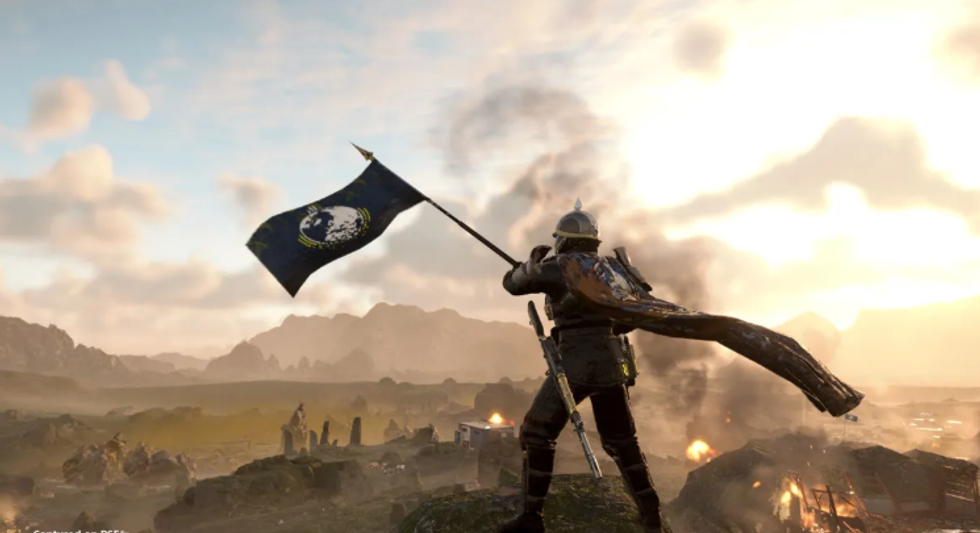Helldivers 2 has experienced a dramatic surge in negative Steam reviews, with over 2,600 posted on 29 May alone, representing a 40-fold increase compared to just two days earlier. The sharp rise in complaints comes amid accusations from players, particularly in China, that the game developer Arrowhead Game Studios is manipulating the in-game Galactic War narrative and misleading players through mistranslation in the Chinese version of the game.
Prior to the review spike, Helldivers 2 had maintained relatively stable feedback, with just 62 negative reviews logged on 27 May. However, tensions escalated as players began to question the integrity of the ongoing in-game conflict, specifically the defence of a strategic city called Equality-On-Sea. This city has been dubbed "Super China" by the community due to its resemblance to Shanghai (which translates as "upon the sea").
The controversy centres on the city’s reported defence level of 99.9783%, a figure which has since become a rallying cry among frustrated players. Despite near-total success in defending the location, the game did not register it as fully liberated, leading many to accuse Arrowhead of scripting the outcomes to push the Galactic War storyline in a pre-determined direction.
Further fuelling the discontent is a widely reported mistranslation in the Chinese version of the game. According to multiple sources, including a detailed post from a level 150 Chinese player known as Valkyri_Yukikaze, the Chinese localisation mistakenly suggested that the city could be completely reclaimed through player effort. In reality, game mechanics require the city to remain contested as part of the larger Illuminate invasion narrative. The confusion has led to feelings of betrayal among some Chinese players who believed they had been misled.
Arrowhead has introduced a dynamic war system in Helldivers 2, with player actions supposedly shaping the direction of the game’s storyline. However, some community members are now questioning whether outcomes are genuinely influenced by collective performance, or if major narrative beats are being enforced regardless of player actions. One theory posits that the game was always designed to culminate in a climactic battle for Prosperity City, regardless of earlier mission outcomes.

This theory is supported by patterns observed in the game’s progression, where despite significant player contributions, key objectives appear to remain just out of reach. While many players understand that a game master (GM) figure may guide the story to maintain pacing and drama, the suggestion that developer interference is overriding actual player results has caused backlash, particularly when it appears to conflict with transparent game design.
The 99.9783% figure has become symbolic of this debate. Although the number initially represented the defence progress of Equality-On-Sea, it has since been used in numerous reviews and forum discussions as evidence that the game is not accurately reflecting player effort. In Chinese gaming forums and across Reddit, players have accused Arrowhead of "cooking the numbers" to fabricate tension.
Some commentators, however, have pushed back against the criticism, suggesting that the misunderstandings stem from a lack of familiarity with how war mechanics function within the game. They argue that Helldivers 2, like many live-service titles, incorporates elements of persistent conflict, where cities can remain under threat despite overwhelming success, in order to preserve gameplay longevity and narrative tension.
As of now, Arrowhead Game Studios has not issued a formal response to the review spike or the allegations of misleading translations. The lack of communication has left portions of the player base feeling ignored, while others await clarification. Meanwhile, the Steam reviews continue to pour in, many of them referencing the contested nature of Equality-On-Sea and the perceived manipulation of the war effort.
Despite the controversy, Helldivers 2 continues to maintain a substantial player base, and many users remain engaged with the game’s cooperative missions and evolving warfront. Still, the incident highlights the fragility of player trust in live-service games, particularly when localisation errors and perceived narrative interference converge.
The controversy also sheds light on the broader challenge of managing a global gaming audience. Miscommunications arising from localisation mistakes can escalate quickly in tightly-knit gaming communities, especially when combined with high emotional investment and competitive in-game stakes.
The developer's next steps could prove crucial. Whether through improved communication, transparency about narrative direction, or localisation updates, Arrowhead’s response will likely shape the future relationship with its player base. Until then, the 99.9783% saga continues to be a point of contention, emblematic of broader concerns about authenticity and fairness in player-driven storytelling.





